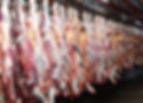Kenya Meat Commission Price List, Outlets, Branches & FAQs
- BeyondForest
- Nov 6, 2025
- 7 min read
Updated: Dec 3, 2025

1.)About Kenya Meat Commission (KMC)
2.)KMC Price List
3.)KMC Athi River Plant – What You Should Know
6.)How to Supply Meat to KMC (Requirements & Process)
8.)KMC Tenders – How to Apply & Current Opportunities
surprising fact many people don’t know is that KMC was once Kenya’s biggest foreign exchange earner, exporting canned beef globally

Kenya Meat Commission (KMC) is one of the oldest state corporations in Kenya, established in 1950 under the Meat Commission Act to promote, regulate, and stabilize the meat industry. Its original mandate was to provide a reliable market for pastoralists, especially in arid and semi-arid regions, while ensuring Kenya had a consistent supply of high-quality beef and livestock products.
Kenya’s meat industry is worth over KSh 300 billion annually.

KMC collects all the blood and processes into a product known as blood meal. You can buy this product from KMC Athi River.KMC blood meal is a highly enriched and valued product. The Commisison hardly meets the supply owing to its demand. -Kenya Meat Commission

Over the decades, KMC has faced several challenges, including old machinery, poor management, limited funding, competition from private abattoirs, and inconsistent livestock supply from pastoral areas during drought seasons. These issues at some point nearly crippled operations, leading to temporary closures and restructuring.
Want To Compare Farmers Choice Price List Click Here >>>
Despite this, KMC has made notable achievements. It operates one of the largest meat processing plants in East Africa at Athi River, has expanded to urban outlets like Kamukunji, and consistently supplies affordable, hygienic beef to Kenyans. It is also among the few Kenyan processors with Halal certification, allowing it to access Middle East export markets.
KMC recently confirmed having 0.3661 grams ox gallstones available, which shows how rare and valuable the product is.

Ox gallstones are hard, naturally formed stones found in the gallbladder of cattle. They are collected during meat processing and are considered one of the most valuable animal by-products in the world.

Cow in metal pen with close-up view at KMC Kibarani branch
Ox gallstones can sell for $20,000–$40,000 per kilogram, which is approximately KSh 3 million to 6 million per kg, depending on quality and dryness level.
Although Kenya Meat Commission (KMC) provides standard price guidelines for its official outlets, the exact prices may vary slightly from one location to another. As confirmed by KMC themselves, the company operates both official KMC shops and independent franchise outlets. The official shops maintain uniform prices across all branches, but some franchise partners may sell the same KMC products at a slightly higher price.
1 Kilogram KMC ox heart | 230Ksh-330Ksh |
1 Kilogram KMC ox kidney | 300Ksh-400Ksh |
1 Kilogram KMC ox tail | 450Ksh-450Ksh |
1 Kilogram KMC ox Matumbo mix | 230Ksh-330Ksh |
1 Kilogram KMC ox liver | 530Ksh-630Ksh |
1 Kilogram KMC ox spleen | 150Ksh-250Ksh |

Gallstones are highly valued in traditional Chinese medicine and the pharmaceutical industry. They are used for detoxification, liver therapy, fever reduction, and digestive treatments.
Beef Macon 200g | 590Ksh-790Ksh |
Beef Smoky 500g | 240Ksh-440Ksh |
Beef Smoky 1kg | 470Ksh-670Ksh |
Beef Ham 200g | 310Ksh-510Ksh |
Beef Ham 400g | 620Ksh-820Ksh |
Beef Brawn 200g | 130Ksh-330Ksh |
Beef Brawn 400g | 260Ksh-460Ksh |
Kenya Meat Commission uses Sodium Nitrite (E250) preservative on their products

Tripe/Matumbo | 150Ksh-250Ksh |
Heart | 220Ksh-300Ksh |
Liver | 300Ksh-380Ksh |
Mutton | 520Ksh-650Ksh |
Goat Meat | 500Ksh-700Ksh |
Minced Beef | 450Ksh-550Ksh |
KMC Corned Beef | 550Ksh-600Ksh |
Cow Legs | 120Ksh-150Ksh |
Meat on Bone | 650Ksh-750Ksh |
Beef Tallow | 250Ksh-400Ksh |
Bone Soup | 140Ksh-240Ksh |
This means that there is no completely fixed national price for KMC meat, especially for popular cuts like stew beef, fillet, minced meat, goat meat, liver, and tripe. Prices can also fluctuate based on demand, supply of animals, and operational costs at the depots. Therefore, the best practice for customers is to check with the nearest KMC outlet or franchise to confirm the exact price for the day.
Ox gallstones are sold mainly to exporters and pharmaceutical buyers, especially in China, Hong Kong, and Singapore. In Kenya, they are usually sold through licensed abattoirs and processors like KMC.
Peace Meats Kenya Ltd | KU Uni City Mall | 0114 408248 |
Way Beyond Ventures | Kiambu Road, Thindigua | 0768 912753 |
Dualpix Communications Ltd | Ruai Kangundo Road | 0707 019186 |
Vinton Supermarket | Syokimau (Katani Road) | 0758 840100 |
Hagan Fish Karen | Karen Hub | 0768 259216 |
Hagon Fish and Sea Food | Garden Estate | 0792 910507 |
Legit Flesh Ltd | Kamakis | 0721 591693 |
Vemukka Company Ltd | The Circle Mall, Kilimani | 0714 636021 |
North View Supermarket | Maziwa Area, Kamiti Road | 0114 880024 |
North View Supermarket | Mathare North | 0715 098439 |
Zemira White Trades | Kasarani | 0741 905264 |
Way Beyond Ventures | Kirigiti | 0706 158027 |
GVC Growth Concepts Ltd | Nyali | 0794 621775 |
KMC Nyama Haven | Athi River | 0798 849891 |
KMC Nyama Haven | Kitengela | 0742 136532 |
KMC Nyama Haven | Landhies Road | 0729 095869 |
KMC Nyama Haven | Thika | 0742 137402 |
KMC Nyama Haven | Makupa (Mombasa) | 0741 982853 |
KMC Nyama Haven | Ruai | 0707019136 |
Beef Cut
T-Bone |
Rump Steak |
Boneless |
Beef Ribs |
Goat / Lamb
Chops |
Cutlets |
Legs / Shoulders |
Ribs |
Whole Lamb / Goat |
Value Added Products
I was at ur landies shop on Sunday and bought mutura of 250gm I regret why I did not buy more it was soo delicious will definitely drop by on Saturday for more-Jane Wairimu
Burger Trays |
Meat Balls |
Sausages |
Beef Ham |
Mutura |
KMC Athi River Plant – What You Should Know

The KMC Athi River plant is the main processing hub of Kenya Meat Commission and one of the largest meat factories in East Africa. Located along the Mombasa Road corridor, it handles livestock intake, slaughter, processing, packaging and distribution for both local and export markets.
The facility operates under strict Halal standards, making it a preferred supplier for Middle Eastern buyers. Farmers deliver animals here for live-weight payment after inspection by KMC officers. The Athi River plant is also equipped with cold rooms, canned-meat production lines and value-added processing units, ensuring consistent, affordable meat supply across Kenya.
How to Supply Meat to KMC (Requirements & Process)
Supplying livestock to Kenya Meat Commission (KMC) involves meeting specific quality standards, submitting required documentation, obtaining necessary permits, and following a clear delivery and payment process. Below is a step-by-step guide.
Cattle must be in good health, showing no signs of thriftiness, wounds, skin disease or mishandling.
Minimum encouraged weights: 200 kg for cattle and 20 kg for goats/sheep.
Animals should not be older than 5 years.
Female animals must not be pregnant or in milk at the time of delivery.
Animals should be branded at the recommended sites and transported in line with animal welfare regulations.
2.Get an Order & Movement Permit
Interested suppliers are issued a Local Purchase Order (LPO) and a “No Objection” permit by KMC.
The “No Objection” permit must be taken to the relevant County Veterinary Office to obtain a Movement Permit which must accompany the animals on delivery.
If the supplier cannot collect the documents in person, KMC may send a soft copy via phone or email.
Hi, I’m Evans. Need Data Research or Analysis?
I help businesses gather the right data and turn it into actionable insights.
3. Deliver the Animals
Delivery times are typically from 06:00–17:30 hrs on weekdays.
On arrival, the animals are assessed by the KMC acceptance & inspection committee. They are weighed in the presence of the supplier.
An inspection fee applies: 100Ksh per head of cattle, 25Ksh per goat or sheep.
4. Payment Process
After weighing, KMC provides a detailed statement listing number of animals, sex, individual weights, cumulative weight and payment amount.
Payment is done via RTGS bank transfer to the supplier’s bank account.
5. Documentation & Trading Requirements
For individual farmers:
Tax Compliance Certificate
Copy of National ID
Bank account details
For companies / partnerships:
Certificate of Incorporation
County Council Permit
Bank account details
CR 12 form to declare company directors
Tax Compliance Certificate
Copies of National IDs for all directors
Complete the questionnaire and Request for Quotation (RFQ) form.
6. Contact & Further Information
For further queries on procurement and supply to KMC, reach:
Phone: +254 (020) 2499382 or +254 (020) 2424051
Email: info@kenyameat.co.ke (Attention: Livestock Manager)
KMC Tenders – How to Apply & Current Opportunities
The Kenya Meat Commission (KMC) regularly issues tenders and supplier registration opportunities for a wide range of goods, services and works. Some recent notices include supply and delivery of tyre tubes and vehicle batteries, motor vehicle spares, value addition ingredients (spices & casings), primary packaging for meat and meat-products, and supplier registration for the financial years 2025/26 & 2026/27.
To apply, suppliers must download the tender or registration document from the KMC website or the Public Procurement Information Portal (PPIP).
Completed documents should be sealed in plain envelopes clearly marked with the Tender Number and Name, addressed to “The Managing Commissioner, Kenya Meat Commission, P.O Box 2-00204, Athi River” or deposited in the tender box at the Athi River headquarters reception.
Many tenders are categorized under AGPO (Youth/Women/Persons with Disabilities) and Open (All eligible suppliers) thus offering opportunities for different supplier types.
How much is 1kg of meat at KMC?
KMC’s official outlets maintain uniform pricing, but some franchise shops may charge slightly higher. From recent customer responses, meat on bone retails at around 650Ksh per kilogram.
Where are KMC outlets located?
KMC has official shops as well as franchise outlets across Kenya. Major locations include Athi River, Kamukunji, Thindigua, Syokimau, Karen, Garden Estate, Nyali, Thika, Kitengela, Makupa (Mombasa), among others. Franchise shops like Nyama Haven and Way Beyond Ventures also sell KMC products. You can view the full updated list in the KMC franchise directory.
Who owns Kenya Meat Commission?
Kenya Meat Commission (KMC) is a state corporation established under the Meat Commission Act of 1950. It operates under the Government of Kenya to stabilize, regulate and promote the meat industry while supporting pastoralists and ensuring affordable, quality meat for Kenyans.
How to buy wholesale meat from KMC?
To buy wholesale meat, visit the KMC Athi River plant, Kamukunji outlet, or any major KMC shop. For larger commercial orders, contact the procurement or sales team directly to get a quotation and confirm availability.
KMC standard outlets do not directly offer home delivery; however, several franchise partners may provide delivery services at their discretion.
Do I have to transport animals myself when supplying to KMC?
Yes. KMC requires suppliers to transport animals to Athi River or Mombasa Kibarani, as they do not currently pick animals from farms. This ensures proper inspection, weighing, and documentation.
















